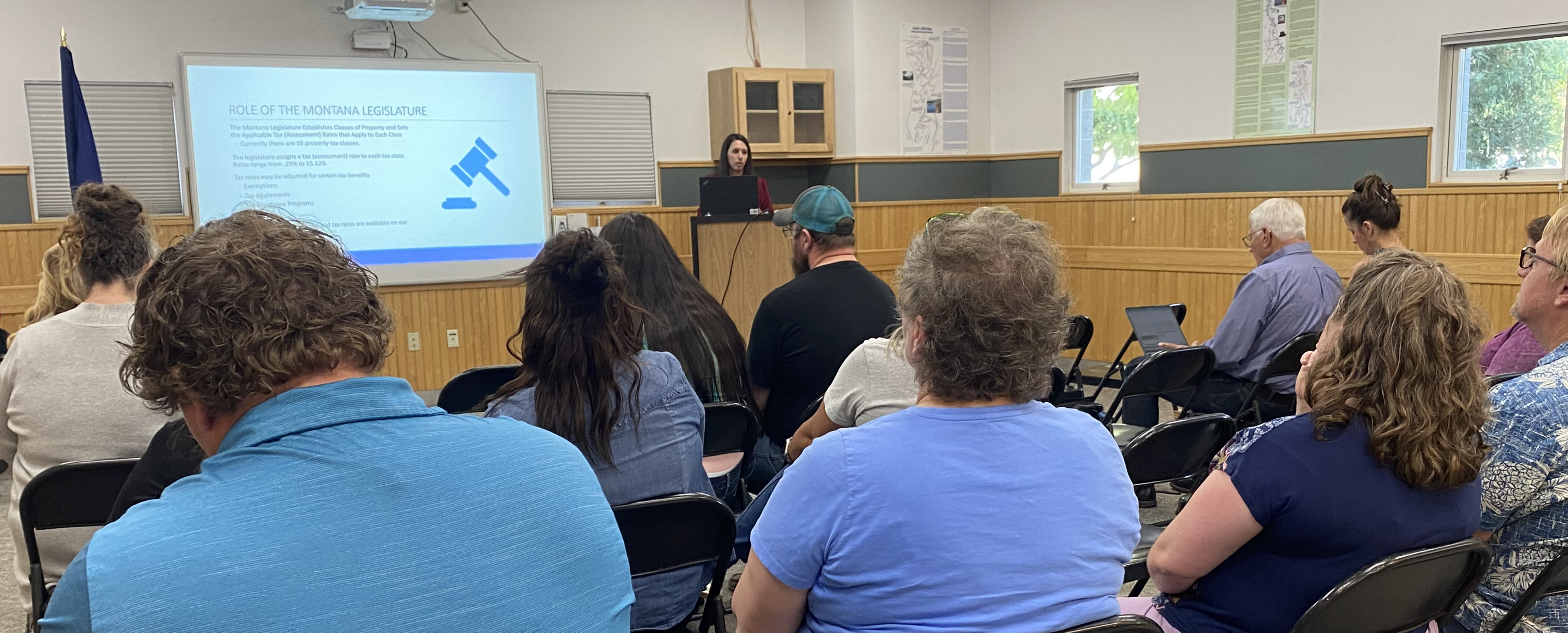Department Of Revenue Hosts Property Tax Town Hall
Author: Linda Kent, MT43 News Staff Reporter
Department of Revenue Hosts Property Tax Town Hall
Linda Kent
MT43 News Staff Reporter
Montana’s Department of Revenue held a property tax town hall in Townsend on Sept. 5. Part informational session on the state’s residential property tax system, part question and answer time and part opportunity for real-time help applying for a 2023 property tax rebate, the meeting hosted around 20 area residents.
Montana’s property tax classes are valued and assessed, beginning with the full market valuation of residential property and validated by statistical models, national databases, and in-person inspections, Katy Kakalecik, Department of Revenue Area Manager explained. Those valuations happen every two years, and property owners have 30 days from notice of re-evaluation to appeal the valuation. She also emphasized that property tax assistance is available for those struggling to pay their bills.
Residential property represents more than 57% of the state’s $2.34 billion tax revenue, Department of Revenue Regional Manager Jason Boggess told the group. The largest fraction of the state’s revenues, 57.2 percent, funds K-12 and post-secondary schools, while 38 percent is returned to counties, cities and towns for their operating budgets.
Boggess said Broadwater County’s $13.7 million tax revenues primarily come from residential property tax, which contributes $8.7 million of the total. That money is returned to the county as approximately $8.3 million in school funding, including funds from the statewide 95-mill school equalization funding assessment.
A “mill” is approximately equal to 0.1 percent of a government’s taxable valuation and varies year-to-year and jurisdiction-to-jurisdiction based on the entity’s total valuation.
Less than $200,000 goes to the City of Townsend operations, with $4.6 million funding county operations.
Broadwater County Commissioner Lindsay Richtmyer said while county property tax bills include line items for school equalization and other locally approved levies, the county has no control over how those funds are spent. Instead, the county can only use so-called floating mills and voted levies.
Just 17 percent of the county budget comes from floating mills. The remainder comes from non-floating mills, voted levies, grants, entitlements, and payment in lieu of taxes (PILT) funds, she continued.
The county creates its annual budget based on the previous year’s tax revenues and has created a process to review actual spending and revenues with each department on a quarterly basis.
“We take a very conservative approach,” Richtmyer said.
Each county and city has access to a set number of mills it can levy in each year. The number of mills is determined through a formula set out in state law, with increases limited to half the rate of inflation. That limitation, along with property valuations set in arrears by two years, makes it difficult for municipalities and counties to keep up without asking voters for more funding.
While jurisdictions can levy up to the legally mandated number of mills, they are not required to, Richtmyer said. Governments can “bank” mills, reducing one year’s tax revenue, then opt to apply those mills in a future mill. Broadwater County does not bank its mills, Richtmyer said.
Audience members asked for more detail on how the Department of Revenue identifies property values – namely how it determines when the valuation of a residence or related property improvements changes. Kakalecik explained that the state is testing aerial imaging to help identify improved properties – a program which will be expanded to Broadwater and other counties in coming years.
In the meantime, Boggess added, the department depends on information from building permits and other sources to identify where to send its ground teams to perform on-site evaluations.
Montana homeowners are eligible for up to a $675 2023 property tax rebate from the state if they:
● Owned and lived in their residence for at least seven months in 2023
● Were billed property tax on that residence in 2023
● And paid property taxes on that residence for 2023.
Those eligible can apply for their rebates through Oct. 1, 2024, by submitting their claim at getmyrebate.mt.gov or by paper form. Those in need of additional assistance can call 406-444-6900.
Article Images
Click on Image Thumbnail(s) to view fullsize image
PhotoCredit: Linda Kent
Image 1 Caption: Montana Department of Revenue Area Manager Katie Kakalecik reviews the legislature’s role in the state’s property tax assessment and collection process to around 20 area residents during the department’s Property Tax Town Hall Sept. 5. Montana homeowners may be eligible for up to a $675 property tax rebate from the state if they apply by Oct. 1, 2024.
Photo Credits: Linda Kent
